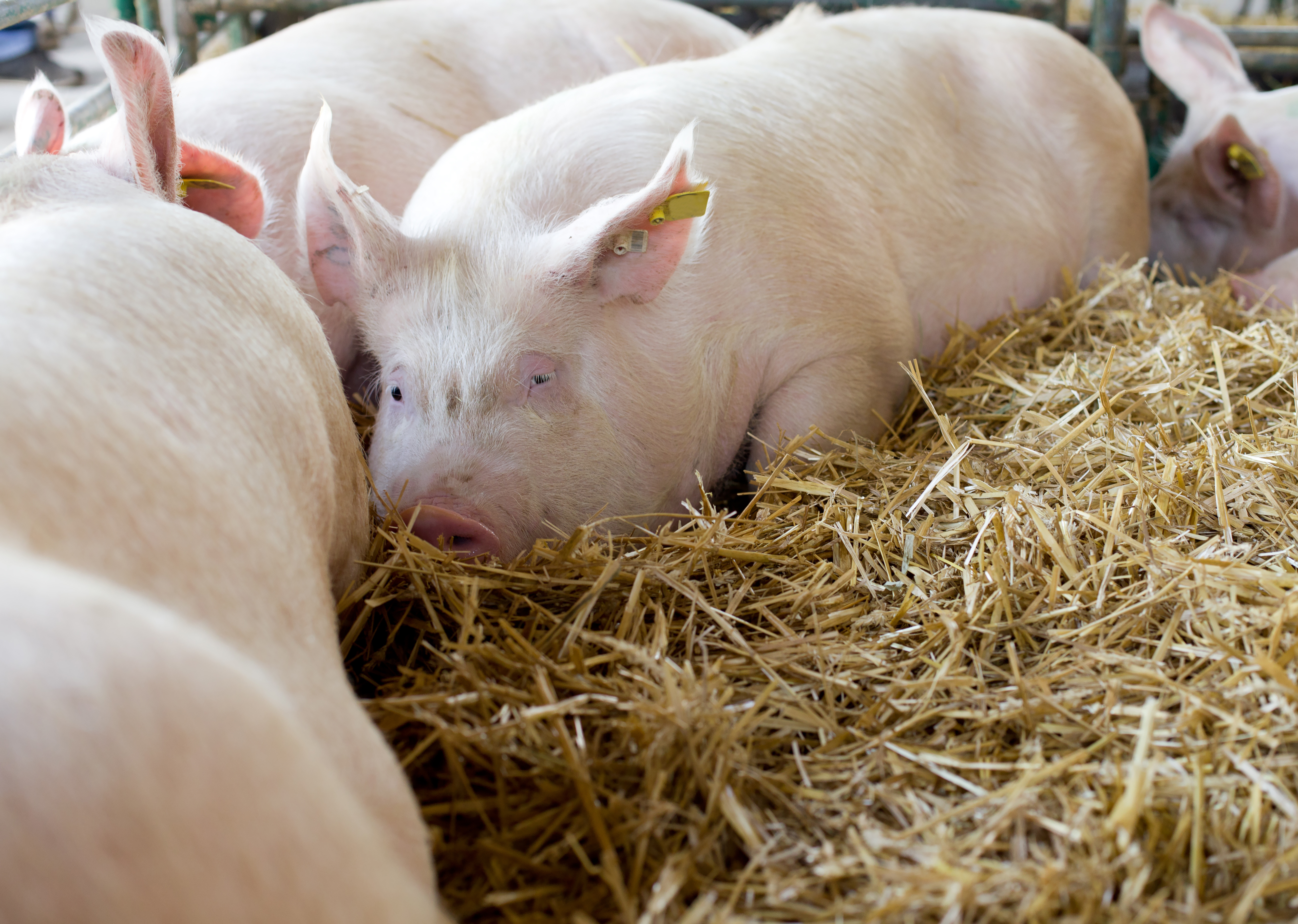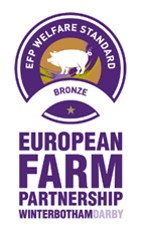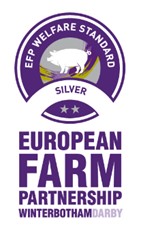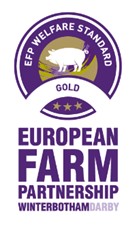



Going for gold: Why one company is setting their own standard for swine welfare in Europe
The Pig Site speaks to David Houghton and Susie White, Winterbotham Darby, about creating the first pan-European UKAS accredited swine welfare standardIn a first for pig welfare, UK-based continental meats supplier, Winterbotham Darby, gained accreditation for their Winterbotham Darby European Farm Partnership (EFP) pig module back in May 2018. The European Farm Partnership brings together farmers, suppliers, industry partners and retailers and lays the foundation for the standard. It is the only accredited standard of its kind for Europe and covers the entire supply chain; breeding, rearing, finishing, transport and slaughter.

Providing hay and proper enrichment are standard practice within the three-tiered, UKAS-accredited swine welfare standard
Winterbotham Darby (WD) currently have two welfare standards:
• WD Pig Scheme (non-accredited)
• European Farm Partnership (EFP) Pig Module standard (accredited standard) – NEW April 2018
Winterbotham Darby Pig Scheme
The WD pig scheme was developed in 2000 and version 1 was released in 2004. This standard was way ahead of EU legislation with the main higher welfare requirement that stalls were prohibited 4 weeks after insemination. This only came into effect in the EU in 2013. The WD Pig Scheme was reviewed and developed (in line with legislation changes, retailer requirements, consumer expectations) and version 4 was released in 2012. Version 4 included aspirational clauses on: non-confinement stalls, non-confinement farrowing, non-tail docking, non-teeth clipping, non-castration and increased environmental enrichment and bedding at all stages.
European Farm Partnership Pig Module
The first pan-European accredited standard for welfare, comprising of three tiers; bronze, silver and gold. Those farms certified to the gold tier will operate to the highest welfare standards in Europe. What is unique about our pig module is that our standard covers the entire element of the supply chain; breeding (freedom farrowing, space etc.), rearing, finishing, transport and slaughter. It also takes into account health & welfare – commitment (space, light, no surgical procedures) antibiotic usage & medicine, feed, veterinary procedures, biosecurity, pest control.
To find out more about the process of developing this standard, The Pig Site spoke to Winterbotham Darby’s David Houghton, technical director, and Susie White, communications manager.
What led to the decision to work towards accrediting your welfare standard?
We wrote our own standards, fifteen years ago – that evolved through three or four versions – but we decided around three and a half years ago to get the standard accredited to give it more authority and I guess to professionalise what we were doing. People like being certified or awarded – we were doing that with our scheme; giving farmers certificates, for example – but to have it with a properly accredited standard would be the right thing to do.
Secondly, there was only one other standard that was being used in Europe, but that was just around EU legislation; there's no higher welfare standard and no multi-tiered welfare standard that goes right across Europe. Therefore, our standard is unique in that it is the first standard that's: a) pan-European; and b) multi-tiered.
We want to use the standard to push people through the tiers; to create a plan to move them from a bronze level, which is above EU legislation, and help them to achieve silver- and gold-tier standard.
Now that you have received accreditation, what are the next steps?
At the moment, the first step for us is to get our existing companies covered under the current pig scheme to transition over to the accredited standard. We've already started that – through the accreditation process we’ve had to audit farms against the accredited standard – some farms are already part of that audit. Now we're transitioning the rest from the old system to the new.
This standard will be used for Waitrose, Co-op, Sainsbury’s and it's recently been added to the list for Morrisons – I [David] have presented the standard to Sophie Throup, the new head of agriculture there. Tesco also ask for their farms to be against an accredited standard, so our standard could be applicable to Tesco as well.
The standard meets every retailer requirement, and the silver and gold, in some cases will exceed their welfare standard.
In terms of where this standard will be applied by supermarkets, we’ll definitely use it in the UK, but I’m hoping it could provide much bigger opportunities in terms of taking it to non-UK retailers and seeing what interest is there because at the moment they're purely reliant on either self-certification or self-approval, rather than a government-approved standard.
Another step for us could be having a more direct relationship with consumers and having a simple, recognisable way of indicating that a product is from a higher welfare system when produced under our gold-tier standard. With the accreditation, extensive research, working with Compassion in World Farming, and our close relationship with our producers, we can legitimately claim that our products are from higher welfare systems.
One of our priorities is to move the conversation about welfare and product price on so that consumers understand exactly why one product costs more than another, and what animal welfare means when it comes to food production. With the three tiers, you can use them as a way to speak to customers; to say, “Look, this is the legislation; these are the three tiers of welfare; these are the differences; and these are the different costs that are associated with each tier.”
We believe this structure of welfare standards will provide good motivation for people wanting to improve their welfare standards, and those that are yet to start that journey.
The differences between the 3 tiers:
 EFP Bronze Tier (based on the existing WD Pig Scheme)
EFP Bronze Tier (based on the existing WD Pig Scheme)
The bronze standard is considered to be above legislation and in line with/ above Red Tractor standard. The main areas above are as follows:
• Moved into farrowing crates 5 days prior to farrow (rather than 7)
• Higher space requirements for sows and gilts
• Increased daily checks at breeding farms
• Increased vet visits
• The scheme includes the abattoir/ stunning/ slaughter/ killing
WD thought it was important to recognise and reward the existing farms that have been working to the WD Pig Scheme over past years by having the EFP accredited bronze tier standard equivalent to the WD Pig Scheme Standard.
 EFP Silver Tier (EFP Bronze plus trials on the aspirational clauses from the WD Pig Scheme)
EFP Silver Tier (EFP Bronze plus trials on the aspirational clauses from the WD Pig Scheme)
Significant trials underway for the higher welfare gold tier commitments:
• Freedom farrowing
• Non-confinement insemination
• No surgical castration
• No teeth clipping / grinding
• No tail docking
• Bedding being provided at all stages
In addition the following areas are higher than the EFP Bronze Tier
- Space requirements at all stages
- Environmental enrichment
- Emergency water supply
- Fallen stock management
 EFP Gold Tier
EFP Gold Tier
All higher welfare gold tier requirements in place:
• 100% freedom farrowing
• 100% non-confinement insemination
• 100% no surgical castration
• 100% no teeth clipping / grinding
• 100% no tail docking
• 100% bedding being provided at all stages
In addition the following areas are higher than the EFP Silver Tier
- Increased space requirements at all stages
- Water testing
- Emergency water supply
- Air testing
- Unit plan and corrective actions
- Strict delivery rules
- Increased welfare during transport (drinkers, ventilation, bedding)
Timescales on EFP Standard Implementation across WD Farm Schemes
- Italy: in progress and a number of farms are silver and gold. All farms will be certified by end 2019
- Spain: all breeding farms to be certified by end of 2019 and all finishing farms to be certified by end of 2020
- France: all farms to be certified by end of 2019
- Germany: all farms to be certified by end of 2020
The Pig Site









